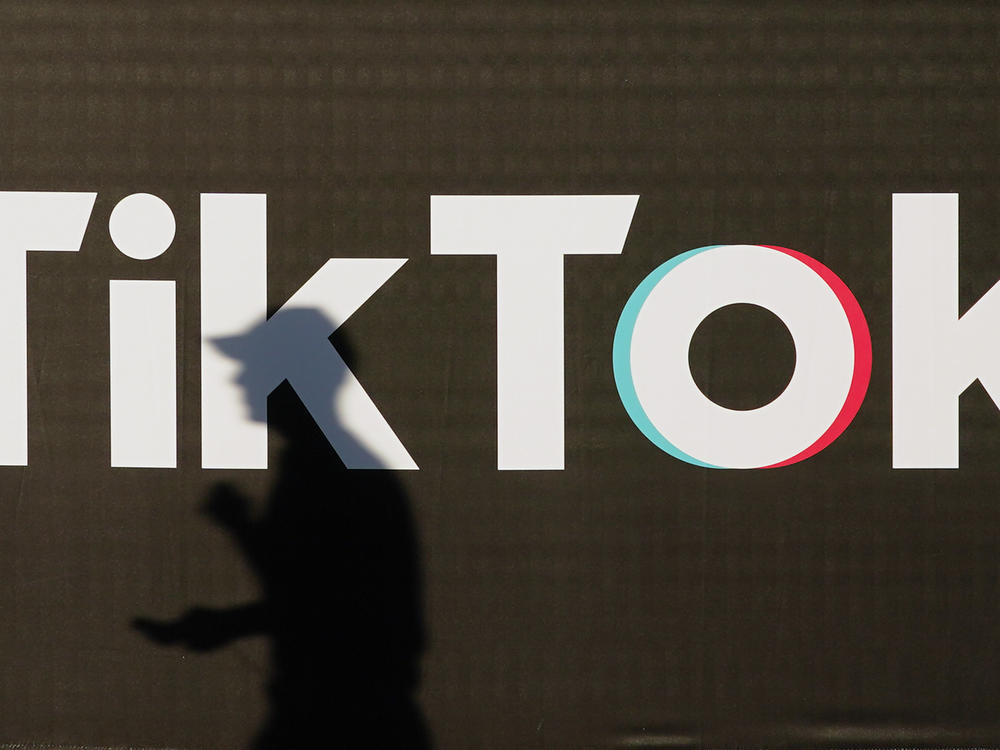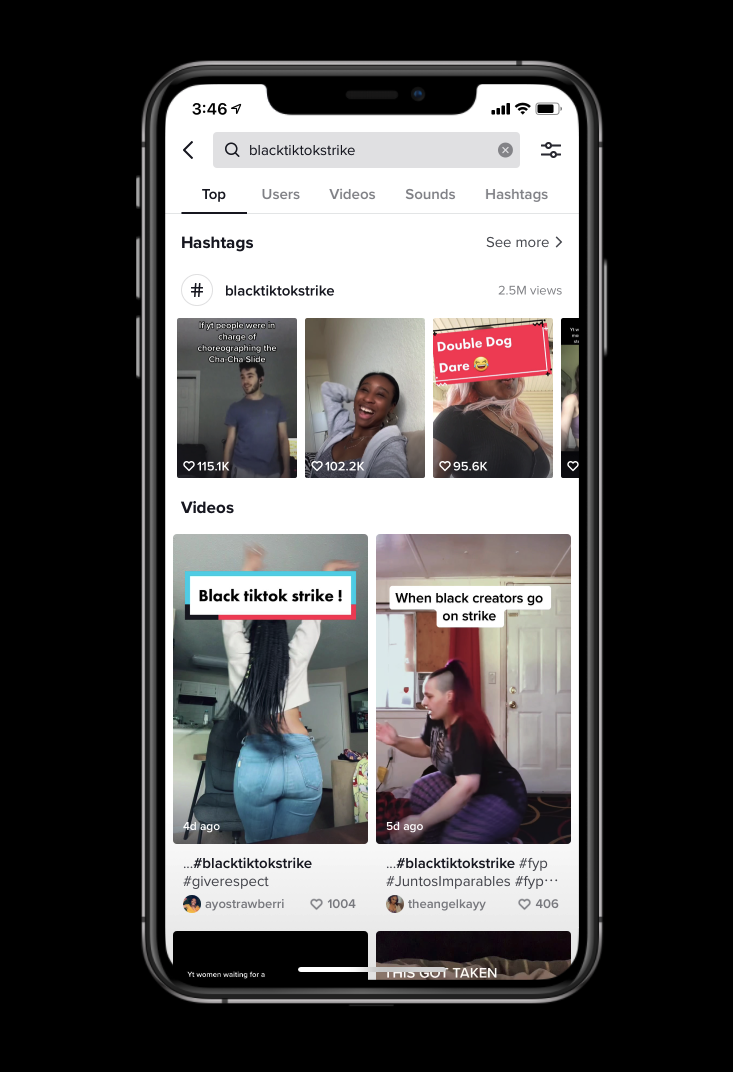Section Branding
Header Content
Black TikTok Creators Are On Strike To Protest A Lack Of Credit For Their Work
Primary Content
Black creators on TikTok are hanging up their dancing shoes until further notice.
Tired of not receiving credit for their creativity and original work — all while watching white influencers rewarded with millions of views performing dances they didn't create — many Black creators on TikTok joined a widespread strike last week, refusing to create any new dances until credit is given where it's due.
The hashtag "BlackTikTokStrike" has been viewed more than two million times on TikTok, with users sharing videos of less inspired dances that have popped up in the absence of Black creators. The hashtag has taken off on Twitter as well.
If you were to check out TikTok videos featuring Megan Thee Stallion's latest hit, "Thot S***," for example, what you'd find instead of another viral dance challenge are videos by Black creators calling out the lack of credit they receive and raising awareness of the strike.
One video, which has been viewed more than 440,000 times, shows Erick Louis, a Black TikTok creator, seemingly about to introduce a new dance before flipping the script with a caption that reads "Sike. This app would be nothing without [Black] people." (And even that, Louis said in another post, was copied by a pair of TikTok users whose video got 900,000 views.)
The situation called to mind the recent TikTok controversy surrounding the Nicki Minaj song "Black Barbies." With lyrics like, "I'm a f****** Black Barbie. Pretty face, perfect body," the song was used on the app to showcase videos of Black beauty. But white users soon began using the song as well, kicking off a debate about cultural appropriation on the app.
While TikTok has only been around since 2016, it has already emerged as an example of how new forms of technology are being used as a tool for cultural appropriation, according to Sarah J. Jackson, an associate professor and co-director of the Media, Inequality & Change Center at the University of Pennsylvania's Annenberg School for Communication. While Jackson's work does not focus on TikTok, much of her research centers on the intersection of race, media and activism.
"A large swath of American popular culture comes from Black culture and that is before the internet even existed," Jackson said. "We can take any historical period and look at popular culture, at any particular historical period, and see the ways in which white folks who have access to mainstream capital and mainstream media and other forms of access were drawing inspiration from the art forms and creative forms of Black folks."
Dissatisfaction has been brewing for some time
Black creators on the app have long been calling out what they say is the preferential treatment that white creators receive. In March, late night talk show host Jimmy Fallon invited TikTok star Addison Rae Easterling to perform a seriesof eight viral TikTok dances on his show, none of which she created. The creators of those dances were not featured for the segment, nor were they given credit, aside from the show posting their usernames in the description box of the YouTube video after the episode aired. After considerable backlash, Fallon invited the actual creators of the dances onto his show the following month, and acknowledged that they "deserve their own spotlight."
But the Fallon episode wasn't the first example, nor will it likely be the last, of Black TikTok creators being overlooked in favor of their white counterparts.
During last year's NBA All-Star Weekend, the NBA invited several white TikTok creators, most notably Easterling and siblings Charli and Dixie D'Amelio. The trio scored prime seats, sat for interviews and were even asked to dance on the court. Easterling's TikTok videos show her performing numerous TikTok dances with NBA cheerleaders and teaching dances to NBA players — including the Renegade dance. The choreography is set to K Camp's "Lottery," and it's one of the most well-known dances on TikTok.
The dance's actual creator — Jalaiah Harmon, a Black teenager from greater Atlanta — was initially not invited until the NBA issued an invitation following pushback on social media. She later made a video that weekend performing the dance with Easterling and Charli D'Amelio, who were criticized alongside the NBA for not acknowledging Harmon earlier. Neither Easterling or the D'Amelios were reachable for comment.
In an interview with The New York Times, Harmon said that unfortunately, not being credited for a world-famous dance that she created, yet seeing it become ubiquitous, has been hard to watch.
"I was happy when I saw my dance all over," Harmon told the paper in 2020. "But I wanted credit for it."
Harmon has only recently begun to receive more widespread recognition for creating one of the first TikTok dances to really take off in popularity, scoring major endorsement deals and magazine covers. But for every Harmon, frustrated users are asking themselves how many Black creators are still struggling not only to get the recognition they deserve, but dealing with antagonism from those who don't understand why receiving that credit is so important in the first place.
When it comes to being credited for one's work, there's crucial historical context to consider, said Jackson.
"Since the founding of this country, Black art forms, Black dance forms, have been appropriated, watered down, repackaged and used to make money by white folks," she said. "And so, if you put it in that context of that longer history of basically stolen labor and stolen creativity, then you start to see why it matters to people and why it's important to people to be credited for the origins of these things."
TikTok says it wants credit for creators to be the norm
It's not the first time that TikTok has been called to the carpet over issues of race. Last summer, numerous Black TikTok users joined together to host a "blackout" to protest content related to Black Lives Matter, police brutality and the murder of George Floyd being seemingly hidden on the app. TikTok responded with an apology to the Black community, referring to what happened as a "technical glitch," promising to "repair that trust" with Black users, and pledging to make the app a more diverse, welcoming space. The company also held town hall and round-table discussions and formed a Creator Diversity Collective.
Still, some Black creators said that, around eight months later, problems with the app persisted, according to NBC News.
In a statement to NPR, a spokesperson for TikTok said Black creators are part of what makes the platform so successful, and that the company is working to build a culture on the app around crediting creators.
"TikTok is a special place because of the diverse and inspiring voices of our community, and our Black creators are a critical and vibrant part of this. We care deeply about the experience of Black creators on our platform and we continue to work every day to create a supportive environment for our community while also instilling a culture where honoring and crediting creators for their creative contributions is the norm," that statement said.
The company also pointed to a recent progress report on its diversity efforts and referenced the recent launch of the @BlackTikTok page, an official TikTok account run by Black employees.
In the meantime, Black creators are still using the app, but instead of creating dances that get stolen, they're calling out non-Black users and pointing out just how much everyone else is struggling without their input.
Just consider the case of "Thot S***." It's a summer anthem waiting to happen, but the dances that are being posted to the song don't have the same magic as previous viral creations, despite the fact that, as many online have pointed out, the song's chorus includes pretty simple instructions about putting "hands on [your] knees."
As the strike continues, some users have been posting videos lamenting how different their experience on the app is without Black dance creators.
"When are the Black creators finishing their strike?" a voice-over says in one video. "This app isn't fun anymore."
Copyright 2021 NPR. To see more, visit https://www.npr.org.


